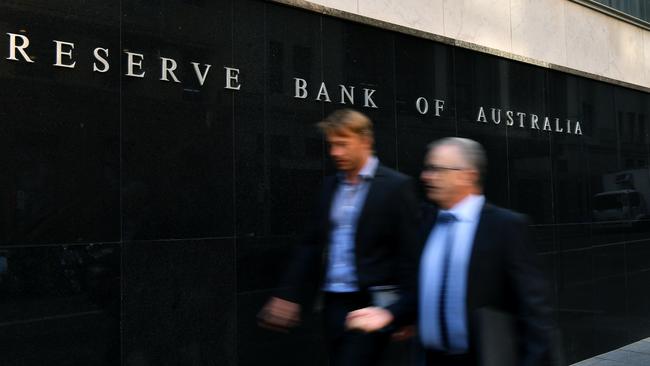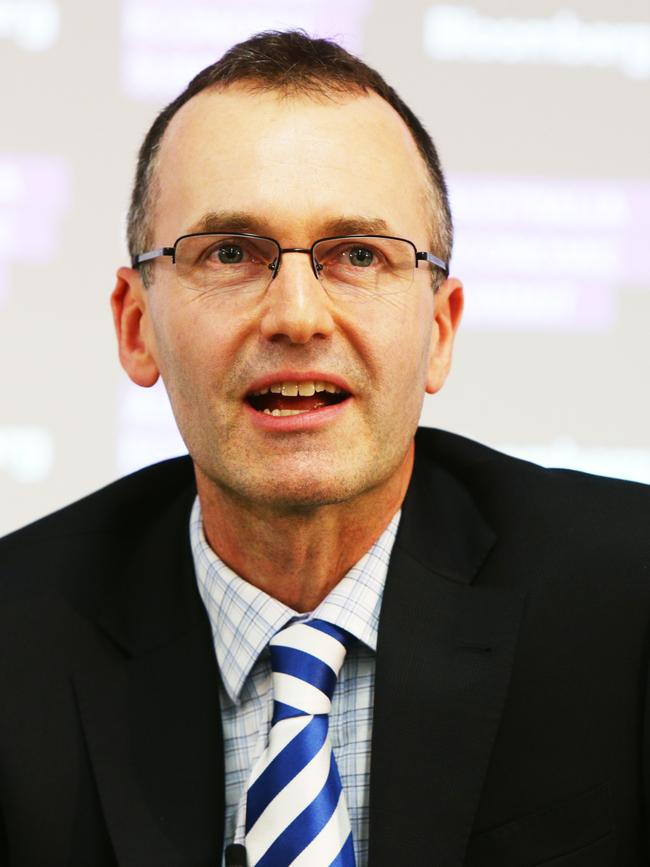Credit Suisse takeover gives central banks pause for thought as Assistant Treasurer Stephen Jones says jitters will calm
Cracks in the global financial system are expected to bring forward the end of interest rate rises.

Cracks in the global financial system are expected to bring forward the end of interest rate rises, with Assistant Treasurer Stephen Jones saying the Albanese government was hopeful UBS’s emergency takeover of troubled lender Credit Suisse would calm jitters in the global economy.
After an emergency $4.8bn rescue plan for the trouble-prone Swiss banking giant Credit Suisse amid fears its collapse could trigger another global financial crisis, RBA assistant governor Chris Kent said local financial markets were more volatile but “are still functioning”.
Dr Kent said Australian lenders had no funding issues and could weather even a prolonged period of market strain.
Mr Jones said “we certainly hope” the rescue deal for Credit Suisse would deliver calm to financial markets after a rollercoaster 10 days roiled bank institutions around the world.
A crisis of confidence has swept the global economy, with Swiss authorities scrambling to broker the deal just days after the collapse of US lenders Silicon Valley Bank and Signature Bank rocked the global banking system.

The takeover of Credit Suisse landed on Monday as some of the world’s biggest central banks banded together to open a US dollar funding facility for financial markets to ensure enough liquidity is available in the banking system while heading off a credit crunch. The US Federal Reserve, the Bank of England, the Bank of Japan, the European Central Bank, the Bank of Canada and the Swiss National Bank announced a co-ordinated action to provide liquidity via a standing US dollar liquidity swap line arrangement.
The move marks one of the biggest co-ordinated central funding moves since the global financial crisis in 2008.
Shares in European banks fell sharply on Monday night, with UBS itself down more than 9 per cent and heavyweights including Deutsche Bank also tumbling.
Australian investors said there was still concern more global banks with high risk exposure could be vulnerable to collapse. “What we could see over the next week or two is another bank under funding stress, so this is short-term relief – but ultimately we need some sort of system-wide policy put in place,” WAM Leaders portfolio manager Matthew Haupt said. “You basically have got to stop the run on deposits and funding issues with these banks.”
Mr Jones – who is also Minister for Financial Services – told The Australian the strength of the domestic banking sector implied similar liquidity measures were not required here.
“I don’t think we’re near that point,” he said. “All our banks are very well placed (with) strong capital positions (and) are well regulated. The prudential regulator and others are all over it.

“We’re not worried about the situation here, obviously. We’re keen to ensure in the other jurisdictions they can provide the same level of certainty. Nobody complains about strong regulation and conservative prudential management in the middle of a crisis.”
ANZ chief economist Richard Yetsenga said the global monetary policy environment had “shifted” over the past two weeks, and “all central banks are likely to look at pausing rate hikes very soon”.
The bank expects a further 0.25 percentage point increase in the RBA’s cash rate in two weeks time, but that global developments between now and the April 4 board meeting would be influential. Economists at Westpac and JP Morgan now predict an end to back-to-back rate rises in April, citing the uncertainty brought about by recent instability in the global financial system, although both pointed to potential further hikes, with Westpac pencilling in a move in May.
NAB chief economist Alan Oster said “if the RBA wanted an excuse to pause next month, then certainly financial stability could mean they sit on their hands”.

For now, Mr Oster expected a 0.25 percentage point increase to 3.85 per cent at the April RBA board meeting, but he agreed that international developments in the US and Switzerland had brought forward the end to the global cycle of climbing rates.
Meanwhile, thousands of Credit Suisse workers face job cuts, although UBS indicating it had not yet initiated talks to make a deal happen.
“It’s a historic day, and a day we hoped would not come,” UBS chair Colm Kelleher said, adding the market would be “sniffing for some more weakest links”.
“To get full-blown confidence back, we need to see the US guarantee some of the deposits in these regional banks,” he said.
The demise of Credit Suisse has brought an end to a former powerhouse in Australian banking circles, which handled both the sharemarket listing of Telstra – still the biggest single IPO in Australian corporate history – and the privatisation of former national airline Qantas.
Former Credit Suisse chief executive John Wylie said it was a sad day. “It was a hothouse of talent of people who went on to do very good things in Australian finance,” he said. “To see it descend to this is sad day for people who still work there.”
The peak body of Australian financial regulators last week reconvened in an emergency session to discuss the impact of the SVB collapse, just days after their regular quarterly meeting, and officials from the central bank, regulators and Treasury have been in daily contact to monitor the rapidly evolving situation.

Dr Kent said: “I think it’s important to put this (the recent banking troubles) in some perspective; the banking sector is in much stronger shape globally than it was 10 years or so ago.
“What we are talking about here is a few institutions that were poorly managed and did not meet those higher standards that have been imposed on almost all banks globally, and on Australian banks,” he said. “As to what all of this implies for interest rates, it’s just one of many things that the board will be taking into account when it makes its decision next month”.
Monetary policymakers had been solely focused on getting runaway inflation back under control without pushing economies needlessly into recession. But the failures of SVB and other regional lenders, followed by the news out of Switzerland, has complicated that equation.
“There was a disconnect between sharply higher rates without a tightening in financial conditions, and that disconnect has disappeared,” ANZ’s Mr Yetsenga said.
“The ECB has given us a template: hike in a way that validates market expectations, but sharply change your rhetoric to acknowledge how much has shifted, and we expect the US Fed to do something similar this week,” he said.
Dr Kent said the typical lengthy delay between rate hikes and their eventual, full impact on economic activity had been extended by the unusual number of fixed-rate loans taken up during the pandemic.
“Only about 45 per cent of the rise in the cash rate to date had passed through to total scheduled mortgage payments at the end of 2022,” he said.
Additional reporting: Eli Greenblat, Glenda Korporaal
More Coverage






To join the conversation, please log in. Don't have an account? Register
Join the conversation, you are commenting as Logout